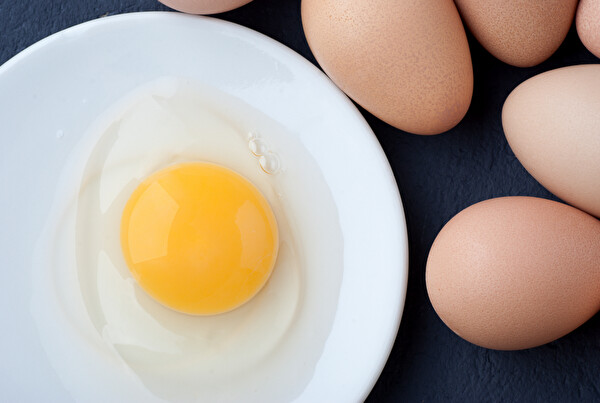Does Eating Eggs Increase Your Risk of Cardiovascular Disease?
Recently, there has been a sort of mini-crisis from egg shortages in several countries around the world. The price of eggs has soared in the United States, and in Taiwan, people have had to wait in line to buy eggs. All this fuss about eggs may have you wondering whether eggs are really an indispensable food. Some studies have found that the more eggs you eat, the higher the risk of cardiovascular disease. However, Dr. Zhang Shiheng, director of Taiwan Chi Le Integrative Medicine Clinic, said in the “Health 1+1” program that if you eat them properly, even consuming four or five a day is not a problem. So what is the best way to eat eggs and stay healthy? When things are busy in the emergency department where he works, Zhang likes to eat tea eggs (eggs cooked with tea and soy sauce) to help him quickly replenish lost nutrients. He said that the nutrition of eggs is quite comprehensive and rich, with a fairly complete combination of amino acids, making them a good source of protein. Many nutrients in the egg yolk are very good for cardiovascular and eye health, as well as brain development. Lecithin in eggs is an important component for cell membranes and helps maintain normal brain function, while zeaxanthin is an important component for the retina and protects vision. Do Eggs Raise Cholesterol? In the past, eggs were thought to be a culprit of high cholesterol. The U.S. Department of Health and Human Services and the U.S. Department of Agriculture recommended in the 2010 Dietary Guidelines for Americans to restrict the daily intake of cholesterol below 300 milligrams per person. However, this recommendation was removed in the 2015–2020 version (pdf). The new version also pointed out that although eggs are high in cholesterol, they are low in saturated fat and can be a good source of protein. Studies have found that most people do not experience a significant increase in blood cholesterol levels after eating high-cholesterol foods. The medical community remains undecided about whether eating too many eggs will increase the risk of cardiovascular disease. The Journal of the American Medical Association (JAMA) published a study in 2019 referring to the results of tracking the eating habits of nearly 30,000 Americans for about 17.5 years. It found that the more cholesterol in food intake, the higher the risk of cardiovascular disease, and eating more than half an egg a day increases the risk of cardiovascular disease by 6 percent. However, a meta-analysis study published in The American Journal of Medicine in 2021 found that eating more eggs was not associated with an increased risk of cardiovascular disease. On the contrary, it said that people who ate more eggs had a lower risk of coronary artery disease. Regarding the JAMA study, Zhang pointed out that it did not clearly distinguish what other things people ate alongside the eggs, and so could not determine a causal relationship between eating eggs and cardiovascular disease. Usually, people don’t eat eggs alone when they eat an American-style breakfast; they may eat bacon with scrambled eggs mixed with butter, bread, or hashbrowns, which all contain a lot of fat and sugar. He believes that the way eggs are cooked has a greater impact on cardiovascular disease than the eggs themselves. (Shutterstock) Zhang believes that people with a normal cholesterol index should have no issues eating four to five eggs daily. However, do not add too much butter or eat alongside high-sugar, oily foods. It is the bad oil from such foods that will raise cholesterol. How to Eat Eggs the Healthy Way Zhang pointed out that the best way to cook eggs is to boil them. He also advises the public not to eat raw eggs. First, raw eggs are not easy to absorb, and second, raw eggs may contain Salmonella. Patients on cancer chemotherapy treatment and/or people with weak immunity should avoid eating raw eggs. If you really like the taste of undercooked eggs, you can eat softboiled eggs whose yolks have not completely solidified. (Shutterstock) Eggs have a complete nutritional value and are suitable for people of all ages, especially for the elderly with bad teeth or sarcopenia. Zhang recommends the elderly consume 1.2 to 1.5 grams (0.04 to 0.05 ounce) of protein per kilogram of body weight as a general guideline, and up to twice that for young people of the same weight. As long as it’s edible, any kind of preparation is fine. If the elderly find it difficult to swallow egg yolks, they are recommended to add oil or water when cooking the eggs. A few recipe suggestions are egg drop soup, Japanese-style steamed eggs, and adding chicken, bonito flakes, or scallops to the steamed eggs for seasoning, all of which are healthy additions for the elderly. Egg Storage and Selection In regard to the global egg shortage, Zhang suggested not hoarding eggs. The key is to eat fresh and healthy eggs. Outside of the United States, eggs are best stored at room temperature, but in the United

Recently, there has been a sort of mini-crisis from egg shortages in several countries around the world. The price of eggs has soared in the United States, and in Taiwan, people have had to wait in line to buy eggs. All this fuss about eggs may have you wondering whether eggs are really an indispensable food. Some studies have found that the more eggs you eat, the higher the risk of cardiovascular disease. However, Dr. Zhang Shiheng, director of Taiwan Chi Le Integrative Medicine Clinic, said in the “Health 1+1” program that if you eat them properly, even consuming four or five a day is not a problem. So what is the best way to eat eggs and stay healthy?
When things are busy in the emergency department where he works, Zhang likes to eat tea eggs (eggs cooked with tea and soy sauce) to help him quickly replenish lost nutrients. He said that the nutrition of eggs is quite comprehensive and rich, with a fairly complete combination of amino acids, making them a good source of protein. Many nutrients in the egg yolk are very good for cardiovascular and eye health, as well as brain development. Lecithin in eggs is an important component for cell membranes and helps maintain normal brain function, while zeaxanthin is an important component for the retina and protects vision.
Do Eggs Raise Cholesterol?
In the past, eggs were thought to be a culprit of high cholesterol. The U.S. Department of Health and Human Services and the U.S. Department of Agriculture recommended in the 2010 Dietary Guidelines for Americans to restrict the daily intake of cholesterol below 300 milligrams per person. However, this recommendation was removed in the 2015–2020 version (pdf). The new version also pointed out that although eggs are high in cholesterol, they are low in saturated fat and can be a good source of protein.
Studies have found that most people do not experience a significant increase in blood cholesterol levels after eating high-cholesterol foods.
The medical community remains undecided about whether eating too many eggs will increase the risk of cardiovascular disease. The Journal of the American Medical Association (JAMA) published a study in 2019 referring to the results of tracking the eating habits of nearly 30,000 Americans for about 17.5 years. It found that the more cholesterol in food intake, the higher the risk of cardiovascular disease, and eating more than half an egg a day increases the risk of cardiovascular disease by 6 percent. However, a meta-analysis study published in The American Journal of Medicine in 2021 found that eating more eggs was not associated with an increased risk of cardiovascular disease. On the contrary, it said that people who ate more eggs had a lower risk of coronary artery disease.
Regarding the JAMA study, Zhang pointed out that it did not clearly distinguish what other things people ate alongside the eggs, and so could not determine a causal relationship between eating eggs and cardiovascular disease. Usually, people don’t eat eggs alone when they eat an American-style breakfast; they may eat bacon with scrambled eggs mixed with butter, bread, or hashbrowns, which all contain a lot of fat and sugar. He believes that the way eggs are cooked has a greater impact on cardiovascular disease than the eggs themselves.

Zhang believes that people with a normal cholesterol index should have no issues eating four to five eggs daily. However, do not add too much butter or eat alongside high-sugar, oily foods. It is the bad oil from such foods that will raise cholesterol.
How to Eat Eggs the Healthy Way
Zhang pointed out that the best way to cook eggs is to boil them. He also advises the public not to eat raw eggs. First, raw eggs are not easy to absorb, and second, raw eggs may contain Salmonella. Patients on cancer chemotherapy treatment and/or people with weak immunity should avoid eating raw eggs. If you really like the taste of undercooked eggs, you can eat softboiled eggs whose yolks have not completely solidified.

Eggs have a complete nutritional value and are suitable for people of all ages, especially for the elderly with bad teeth or sarcopenia. Zhang recommends the elderly consume 1.2 to 1.5 grams (0.04 to 0.05 ounce) of protein per kilogram of body weight as a general guideline, and up to twice that for young people of the same weight. As long as it’s edible, any kind of preparation is fine.
If the elderly find it difficult to swallow egg yolks, they are recommended to add oil or water when cooking the eggs. A few recipe suggestions are egg drop soup, Japanese-style steamed eggs, and adding chicken, bonito flakes, or scallops to the steamed eggs for seasoning, all of which are healthy additions for the elderly.
Egg Storage and Selection
In regard to the global egg shortage, Zhang suggested not hoarding eggs. The key is to eat fresh and healthy eggs. Outside of the United States, eggs are best stored at room temperature, but in the United States, food processing regulations have led to most eggs needing to be refrigerated. Eggs should also be eaten as soon as possible, preferably within a week.
As for the criteria for egg selection, one should look for a smooth, undamaged, and shiny shell surface under the light. There is no direct relation between the color of the eggshell and the egg’s nutritional value.












